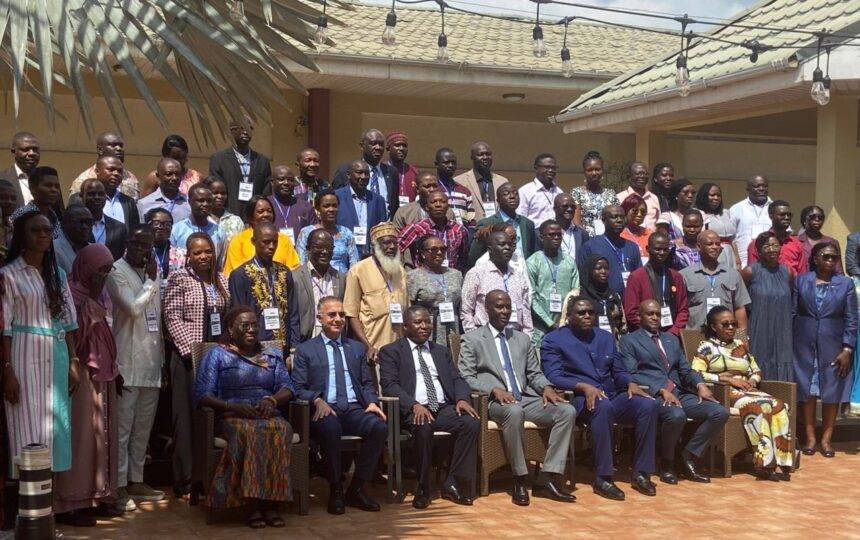Main Points In Hindi (मुख्य बातें – हिंदी में)
मुख्य बिंदु:
-
संशोधन की आवश्यकता: CORAF ने अफ्रीकी देशों से कृषि अनुसंधान में निवेश बढ़ाने और नवाचारों को समर्थन देने का आग्रह किया है, ताकि महाद्वीप पर कृषि पद्धतियों में सुधार किया जा सके।
-
जलवायु परिवर्तन का प्रभाव: डॉ. मौमिनी सावडोगो ने बताया कि जलवायु परिवर्तन खाद्य सुरक्षा को खतरे में डाल रहा है, और इसके खिलाफ विज्ञान-आधारित समाधानों को बढ़ावा देने की आवश्यकता है।
-
संशोधन और संसाधनों का महत्व: कृषि अनुसंधान और विकास में निवेश के लिए सरकारों और निजी क्षेत्र को संरचनात्मक वित्त पोषण तंत्र में निवेश करना चाहिए, ताकि नवीनतम तकनीकें उपलब्ध हो सकें।
-
क्षेत्रीय सहयोग: लगभग 60 शोधकर्ताओं, विशेषज्ञों, नीति निर्माताओं और उद्योग प्रतिनिधियों का एकत्रित होना, टिकाऊ कृषि-खाद्य प्रणालियों के मुद्दों पर चर्चा और समाधान पेश करने का एक प्रयास है।
- विकल्प और नवाचार: प्रोफेसर पॉल बोसु ने किसानों को नवीनतम अनुसंधान आधारित नवाचारों का उपयोग करने की सलाह दी है, ताकि खाद्य सुरक्षा और उत्पादन में स्थायित्व प्राप्त किया जा सके।
Main Points In English(मुख्य बातें – अंग्रेज़ी में)
Here are the main points from the article:


-
Call for Increased Investment in Agricultural Research: CORAF (West and Central Africa Agricultural Research and Development Council) has urged African countries to enhance their investment in agricultural research to support innovations that could transform agriculture on the continent.
-
Insufficient Funding for Sustainable Practices: The forum highlighted that funding for research into sustainable agricultural practices is inadequate, especially in addressing emerging issues like climate change and biodiversity loss, necessitating stronger support for scientists.
-
Impact of Climate Change on Food Security: Dr. Mamouni Sawadogo, CORAF’s executive director, emphasized that climate change poses a significant threat to food security in Africa, advocating for science-based solutions to build resilience in food production.
-
Collaboration Among Stakeholders: The three-day seminar brought together around 60 researchers, policymakers, international partners, and private sector representatives to discuss sustainability in agricultural food systems and propose innovative solutions.
- Need for Innovative Agricultural Practices: Experts stressed the importance of adopting advanced agricultural technologies and practices to enhance food security and resilience among farmers amid the challenges posed by climate change.
Complete News In Hindi(पूरी खबर – हिंदी में)
एडवर्ड एक्वा/वैलेरी असारे द्वारा
अकरा, 19 नवंबर, जीएनए – पश्चिम और मध्य अफ्रीका कृषि अनुसंधान और विकास परिषद (सीओआरएएफ) ने अफ्रीकी देशों से महाद्वीप पर कृषि को बदलने की दिशा में नवाचारों का समर्थन करने के लिए कृषि अनुसंधान में अपना निवेश बढ़ाने का आग्रह किया है।
फोरम ने पाया कि टिकाऊ कृषि पद्धतियों की दिशा में अनुसंधान के लिए धन पर्याप्त नहीं था और जलवायु परिवर्तन, जैव विविधता हानि और कृषि-खाद्य प्रणालियों पर उनके प्रभाव जैसे उभरते मुद्दों के समाधान के लिए अत्याधुनिक अनुसंधान विकसित करने के लिए वैज्ञानिकों के लिए समर्थन जुटाया।
डॉ मौमिनी सावडोगो, CORAF के कार्यकारी निदेशक ने मंगलवार को अकरा में पश्चिम और मध्य अफ्रीका में कृषि और पर्यावरणीय स्थिरता की स्थिति पर एक संगोष्ठी के उद्घाटन समारोह में यह आह्वान किया।
वैज्ञानिक और औद्योगिक अनुसंधान परिषद (CSIR) के सहयोग से CORAF द्वारा आयोजित तीन दिवसीय कार्यक्रम, विषय पर था: “”कृषि और पर्यावरणीय स्थिरता: पश्चिम और मध्य अफ्रीका में कृषि-खाद्य प्रणालियों को बदलने का मार्ग” .
इस कार्यक्रम में क्षेत्र में कृषि-खाद्य प्रणालियों की स्थिरता के महत्वपूर्ण मुद्दों पर चर्चा करने और नवीन समाधान पेश करने के लिए लगभग 60 शोधकर्ताओं और विशेषज्ञों, नीति निर्माताओं, अंतर्राष्ट्रीय भागीदारों और निजी क्षेत्र के प्रतिनिधियों को इकट्ठा किया गया।
प्रोफेसर सावाडोगो ने कहा कि जलवायु परिवर्तन ने महाद्वीप पर खाद्य सुरक्षा को खतरे में डाल दिया है और महाद्वीप को खाद्य उत्पादन में लचीलापन और पर्याप्तता बनाने में मदद करने के लिए “विज्ञान-आधारित समाधान” को बढ़ावा देने की वकालत की।
उन्होंने कहा, “सरकारों और निजी क्षेत्र को कृषि अनुसंधान और विकास में विशेष रूप से संरचनात्मक वित्त पोषण तंत्र में निवेश करना चाहिए जो हमारे राष्ट्रीय कृषि अनुसंधान प्रणालियों को नवीनतम तकनीक और उपकरण प्राप्त करने में मदद कर सकता है।”
अफ्रीकी महाद्वीप अत्यधिक सूखे, अनियमित वर्षा, समुद्र के बढ़ते स्तर, बाढ़ और अन्य चुनौतियों से जूझ रहा है जो खाद्य प्रणालियों को प्रभावित करते हैं और भूख और गरीबी में योगदान करते हैं।
द स्टेट ऑफ द क्लाइमेट इन अफ्रीका 2019 रिपोर्ट के अनुसार, पूरे अफ्रीका में उगाई जाने वाली प्रमुख अनाज की फसलें 2050 तक जलवायु परिवर्तन से प्रतिकूल रूप से प्रभावित होंगी, पश्चिम और मध्य अफ्रीका में औसत उपज में 13 प्रतिशत और उत्तरी अफ्रीका में 11 प्रतिशत की कमी का अनुमान है। , और पूर्वी और दक्षिणी अफ़्रीका में 8 प्रतिशत।
कृषि अफ्रीका की अर्थव्यवस्था की रीढ़ है और पूरे महाद्वीप में अधिकांश आजीविका के लिए जिम्मेदार है।
सीएसआईआर के महानिदेशक प्रोफेसर पॉल बोसु ने कहा कि अनुसंधान महाद्वीप पर जलवायु परिवर्तन के खिलाफ टिकाऊ खाद्य प्रणालियों के निर्माण का आधार होना चाहिए।
उन्होंने किसानों से स्थायी खाद्य सुरक्षा हासिल करने के लिए शोधकर्ताओं द्वारा विकसित नवाचारों का उपयोग करने का आग्रह किया।
“अगर किसान खेती में पुरानी प्रौद्योगिकियों और पद्धतियों का उपयोग करना पसंद करते हैं तो हम ज्यादा कुछ हासिल नहीं कर पाएंगे।” प्रोफेसर बोसु ने कहा।
पर्यावरण, विज्ञान, प्रौद्योगिकी और नवाचार मंत्रालय के मुख्य निदेशक डॉ. पैट्रिक नोमो ने कहा कि किसानों को बदलते मौसम के मिजाज के खिलाफ लचीलापन बनाने और अपनी उपज और आय बढ़ाने के लिए नवीन तरीके अपनाने चाहिए।
उन्होंने प्रतिभागियों से नीतिगत निर्णयों का समर्थन करने के लिए नवीन समाधानों पर विचार-मंथन करने का आग्रह किया जो इस क्षेत्र में चुनौतियों का समाधान करेंगे।
“हम उम्मीद करते हैं कि यह संगोष्ठी हमें आज से आगे देखने और भविष्य से पहले कार्य करने की आवश्यकता के बारे में प्रेरित करेगी।” डॉ नोमो ने कहा.
जी एन ए
Complete News In English(पूरी खबर – अंग्रेज़ी में)
By Edward Aqua/Valerie Asare
Accra, November 19, GNA – The West and Central African Council for Agricultural Research and Development (CORAF) has urged African countries to increase their investment in agricultural research to support innovations aimed at transforming agriculture on the continent.
The forum found that funding for research into sustainable agricultural practices is insufficient and highlighted the need for support to develop cutting-edge research to address emerging issues such as climate change, biodiversity loss, and their impacts on agricultural food systems.
Dr. Moumini Sawadogo, the Executive Director of CORAF, made this call during the opening ceremony of a seminar on agricultural and environmental sustainability in West and Central Africa, held in Accra on Tuesday.
Organized by CORAF in collaboration with the Council for Scientific and Industrial Research (CSIR), the three-day event focused on the topic: “Agriculture and Environmental Sustainability: New pathways to transform agricultural food systems in West and Central Africa.”
The event gathered around 60 researchers, experts, policymakers, international partners, and representatives from the private sector to discuss critical issues of agricultural food system sustainability in the region and propose innovative solutions.
Professor Sawadogo emphasized that climate change poses a threat to food security on the continent and advocated for the promotion of “science-based solutions” to help make food production more resilient and sufficient.
He stated, “Governments and the private sector should invest in agricultural research and development, especially in structural financing mechanisms that can assist our national agricultural research systems in acquiring the latest technologies and tools.”
The African continent is facing significant challenges such as drought, irregular rainfall, rising sea levels, floods, and other factors that affect food systems and contribute to hunger and poverty.
According to the State of the Climate in Africa 2019 report, major cereal crops across Africa are expected to be adversely affected by climate change by 2050, with an average yield reduction of 13 percent in West and Central Africa, 11 percent in North Africa, and 8 percent in Eastern and Southern Africa.
Agriculture is the backbone of Africa’s economy and is responsible for the livelihoods of many people across the continent.
Professor Paul Bosu, Director-General of CSIR, stated that research should be the foundation for building sustainable food systems against climate change on the continent.
He urged farmers to utilize innovations developed by researchers to achieve sustainable food security.
“If farmers prefer to use outdated technologies and methods in farming, we won’t achieve much,” Professor Bosu added.
Dr. Patrick Nomo, Chief Director of the Ministry of Environment, Science, Technology, and Innovation, stated that farmers need to adopt innovative approaches to build resilience against changing weather patterns and to increase their yields and income.
He encouraged participants to brainstorm innovative solutions that will support policy decisions addressing challenges in the region.
“We hope this seminar inspires us to look beyond today and to take action for the future,” Dr. Nomo said.
GNA










